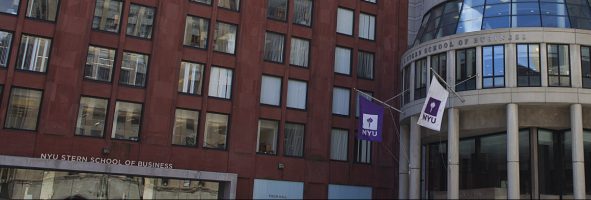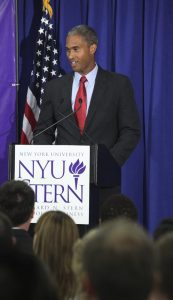NYU Stern Dean Plans to Resign, Citing Economic Trends

Members of the NYU Stern School of Business community today learned that Dean Peter Blair Henry will step down from his position at the end of this calendar year, having decided that the current state of the world calls for him to contribute in other ways.
“I did not make this decision lightly, but given the current trends affecting the national and global economy, I feel compelled to re-engage now with policy and recommit, full-time, to scholarship and my lifelong interest in the linked fortunes of advanced and developing economies,” he wrote in a letter to the Stern community. “At a time when advanced-nation rhetoric and a seeming unwillingness to commit to the reforms needed for growth are at odds with global population trends and an increased need for investment in the developing world, I believe now is the time for me to make further contributions as an economist, advisor and Stern professor,” he continued.
The Jamaican-born Blair is an expert on the global economy, led the external economics advisory group for then-Senator Barack Obama’s presidential campaign in 2008 and was later chosen to lead the Obama Transition Team’s review of international lending agencies such as the International Monetary Fund (IMF) and the World Bank. Obama appointed him in June 2009 to the President’s Commission on White House Fellowships. Before joining Stern, Henry taught at Stanford Graduate School of Business, where he was also associate director of the Center for Global Business. He joined NYU Stern as its youngest ever dean in 2010.
His contributions as NYU Stern Dean in his eight years have been noteworthy. He arrived at a business school known for its expertise in finance and its proximity to Wall Street in the immediate aftermath of the financial crisis, which is to say, with his work cut out for him. “Over the past seven-plus years, together we doubled-down on existing strengths and achieved new heights in areas where we were lagging, notably fundraising,” he wrote to the Stern community.
Indeed, prior to Henry’s arrival, the school had yet to break the $40 million mark for fundraising in a given year, according to a letter sent out today from NYU President Andrew Hamilton and Provost Katherine Fleming. The school has raised more money under Henry’s leadership—more than $225 million—than under any prior dean, including more than $40 million in each of the last three fiscal years and an all-time high of $54.6 million in the most recent fiscal year.

NYU Stern Dean Peter Blair Henry
“Access to higher education for the most qualified students, regardless of their means, motivated Peter’s fundraising,” Hamilton and Fleming wrote. Of last year’s record funds raised, $45.7 million went toward scholarships. Before Henry arrived, Stern had no full scholarships for undergraduate students; today it boasts 37. Another thing that’s grown under Henry’s leadership is the number of Nobel Prize winners on the Stern faculty, tripling from the lone Nobelist it claimed when he arrived.
Record Fundraising Supports Multiple Firsts at Stern
The record fundraising efforts Henry led also helped to almost triple the number of experiential projects Stern students can take part in, propelled a first-of-its-kind FinTech MBA specialization, established the unique Urbanization Project directed by Stern Professor Paul Romer, and paved the way for new centers like the Center for Business and Human Rights and the Center for Sustainable Business, also both firsts for a leading business school. Henry has also worked to both widen and deepen the school’s relationships with tech companies, venture capital firms and fashion and luxury brands.
“These innovations have positioned the Stern School as a leader in research and student engagement in areas from digital currency to the global infrastructure challenge that hold the key to inclusive growth in the 21st century,” wrote Hamilton and Fleming.
“NYU is exceptionally proud of Peter’s accomplishments, his unwavering and unapologetic focus on business as a force for doing well and doing good, and his service not only to the Stern School but also to the university, as our partner in global education, an undisputed leader in fundraising, and a voice for our community as part of the NYU Equity, Diversity and Inclusion Task Force,” they continued.
Henry, for his part, cites getting to know students as one of his biggest joys as dean. “From the classroom to the catwalk, in the hallways, office hours and on the basketball court, seeing students thrive at Stern and then watching them flourish after graduation has been, and will continue to be, a source of great inspiration.”
Henry will remain on as dean for the next 10 months as the school conducts an international search for his successor.
This article has been edited and republished with permissions from Clear Admit.
Anxiety Persists for MBAs Despite Court Rebuke of Immigration Ban

Last week, a three-member panel of judges from the U.S. Court of Appeals for the Ninth Circuit refused the Trump administration’s call to reinstate a ban barring the entry of all refugees and visitors from seven predominantly Muslim countries into the United States. Although the case could still advance to the Supreme Court, yesterday’s ruling means that, for now, the executive order signed by President Donald Trump two weeks ago remains unenforceable.
That’s good news for international students from the affected countries, some of whom were detained at airports attempting to return to campus from overseas travel, others of whom were forced to cancel plans to leave the United States for fear they might not be allowed back in.
States Cite Harm to Higher Education as Major Reason for Opposing Ban
In affirming that the states of Washington and Minnesota had legal standing to bring the case against the immigration ban, the appellate judges specifically cited the ban’s injurious impact on the states’ public universities.
An excerpt from the ruling:
“Specifically, the States allege that the teaching and research missions of their universities are harmed by the Executive Order’s effect on their faculty and students who are nationals of the seven affected countries. These students and faculty cannot travel for research, academic collaboration, or for personal reasons, and their families abroad cannot visit. Some have been stranded outside the country, unable to return to the universities at all. The schools cannot consider attractive student candidates and cannot hire faculty from the seven affected countries, which they have done in the past.”
Citing the new court precedent, the judges argued that schools can assert the rights of their students. “The interests of the states’ universities here are aligned with the students. The students’ educational success is ‘inextricably bound up’ in the universities’ capacity to teach them,” the ruling says. “And the universities’ reputations depend on the success of their professors’ research.”
Of course, these concerns were not limited to public universities in the states of Washington and Minnesota. Indeed, as reported here, business schools around the nation were quick to decry the executive order on precisely those grounds. In the days immediately following Trump’s January 27 executive order, deans from Harvard Business School, UC Berkeley’s Haas School of Business, the University of Michigan’s Ross School of Business, the University of Pennsylvania’s Wharton School, NYU Stern School of Business and Columbia Business School, among others, spoke out strongly in opposition to the immigration ban while pledging to support their own affected students.
Global Business Education Is Best Antidote to Economic Nationalism, Say Business School Deans
Earlier this week, the Global Network for Advanced Management, a group of 29 international business schools committed to advancing innovation through global exchange, issued a statement in opposition to the current rise of populism, economic nationalism and anti-globalization rhetoric, noting that the global economy is more interconnected than ever before, making global exchange and engagement more important than ever.
Excerpt from the Global Network letter:
“As deans of Global Network member schools, we recognize that the fundamental drivers of global business are not changing. Technology will continue to advance and disrupt markets and societies, and the transfer of innovations and expertise across borders will continue. We believe that countries that retrench will harm themselves and their citizens. Therefore, we redouble our commitment to collaborative learning across countries and cultures, and to gain and leverage the insights of the best and brightest throughout the world. In this way, we continue to improve educational outcomes and professional development of our students, deliver innovations that benefit business and society, and contribute to a better world.”
This letter carried the signatures of deans from Haas, HEC Paris, INSEAD, Oxford’s Saïd Business School and Yale School of Management, among many others.
In the wake of the executive order, Haas Dean Richard Lyons received a letter signed by more than 1,000 Haas MBA students requesting that he reach out to deans of other business schools to speak out jointly against the executive order. He responded early last week to the Haas community that he had done just that.
Heightened Anxiety Persists
Despite yesterday’s ruling, business schools have encouraged their international students to exercise caution with regard to planned travel outside of the United States. “The temporary restraining order, which halted the enforcement of certain provisions of President Trump’s executive order banning foreign nationals from seven countries from entering the U.S., remains in effect after a decision by the 9th Circuit Court of Appeals,” read a notice posted today on the Harvard International Office (HIO) website. “Despite this ruling, the HIO continues to advise foreign nationals from the seven restricted countries (Iran, Iraq, Libya, Somalia, Sudan, Syria and Yemen) to exercise caution and discuss any travel plans with their HIO Advisor when considering travel outside the United States.”
This is because future court rulings could reinstate the ban, in which case foreign nationals from those countries most likely would not be admitted or readmitted to the country.
Next Year’s International Enrollment at U.S. Business Schools in Question
It remains to be seen what type of impact this uncertainty may have on international enrollment at U.S. business school’s next year. As of this writing, most business schools we reached reported that, thus far, international application volume had not been impacted.
“International application volume in Round 2 was identical to last year,” says Haas Assistant Dean of the full-time MBA Program and Admissions Peter Johnson. “Since our Round 2 deadline was in early January, it was after the election and before the recent executive order. If there is any direct impact from these events, it will likely be seen in the enrollment patterns of admitted international students, in our program and in other MBA programs across the country.”
Concern about the current administration’s policies and their impact on international students has been widespread. “The uncertainty and anxiety surrounding changes in visa and immigration regulations is affecting all international students, not only those from the countries included in the recent executive order,” says Johnson. “We have had questions ranging from ‘Will this impact my chances of admission?’ to ‘Will I be able to do an internship in the U.S.?’”
Johnson confirmed that Haas has no plans to alter its admissions process and will continue to offer spaces in its class to top candidates regardless of their country of origin. “We are committed to maintaining a diverse and inclusive environment, and international students and faculty are an important part of our community and the educational experience of all students,” he pledged.
HBS Managing Director of Admissions and Financial Aid Chad Losee made a similar pledge in a post to his Director’s Blog earlier this week. In it, he reaffirmed the school’s commitment to assembling a diverse class of leaders who will make a difference in the world, wherever they come from. “The recent U.S. executive order restricting travel to America for citizens from certain countries does not change this, nor are we changing our admissions policy or practices as a result,” he wrote.
This article has been edited and republished with permissions from Clear Admit.
Harvard, Stanford Earn Most Annual Business School Applicants

There are so many factors to consider when applying for an MBA program, it can often be overwhelming. Between cost, admissions requirements, location and program quality, narrowing down a select few to focus on for the application process is a challenge within itself. Nonetheless, between the time required to complete an application and the expense of application fees, it’s simply impossible to apply to every program you find interesting. Narrowing your focus to only your top choice schools can save time, money and a load of heartache.
While factors such as those mentioned above, like cost and location, are great ways to help narrow down your options, it is also helpful to take into consideration the competitiveness of each program. For many high-regarded MBA programs, the applicant pool can be so large that only a very small minority of applicants are accepted each year. While it may seem encouraged to “shoot for the stars,” understanding the real probability of your admission to a program can be a crucial factor in deciding whether or not to apply.
Thankfully, the U.S. News Short List, which focuses on particular data points from schools and degree programs around the country, recently compiled a list of MBA programs with the most applicants. As expected, these include some of the top programs in the country all ten programs with the highest applicant numbers were also included among the top 20 schools in the U.S. News 2017 Best Business School Rankings, and eight of them in the top ten.
While these are some of the top programs in the country, more applicants also means more rejections. All ten of these schools have acceptance rates lower than 25 percent, which means the majority of applicants are rejected. For many of these schools, the numbers are staggering. Of the 129 schools ranked this year by U.S. News, the average applicant number was 917. At Harvard Business School, which tops the list of largest applicant pool and the publication’s top-ranked business school in the country, there were 9,686 applicants for the fall of 2015.
Following HBS with the second most business school applicants is the Stanford Graduate School of Business with 7,899 applicants in the fall of 2015 and an acceptance rate of just 6.1 percent. The University of Pennsylvania (Wharton) placed third with 6,590 applicants and a 19.8 percent acceptance rate. Columbia Business School, ranked tenth best business school by the publication, received 5,829 applicants in the fall of 2015 and accepted just 18 percent of its applicants.
Also among the schools with the largest applicant pools were:
- Northwestern University (Kellogg): 4,300 applicants, 5th (tie) in ranking, 20.6 percent acceptance rate
- University of Chicago (Booth): 4,284 applicants, 2nd (tie) ranking, 24.4 percent acceptance rate
- Massachusetts Institute of Technology (Sloan): 4,254 applicants, 5th (tie) ranking 14.6 percent acceptance rate
- New York University (Stern): 3,696 applicants, 20th in ranking, 20 percent acceptance rate
- University of California—Los Angeles (Anderson): 3,533 applicants, 15th in ranking, 19.8 percent acceptance rate
- University of California—Berkeley (Haas): 3,506 applicants, 7th in ranking, 13 percent acceptance rate
Certainly, if you have an extensive resume and strong GRE scores, among other factors, there’s no reason why you shouldn’t be part of the small percentage of accepted applicants to these schools. However, full awareness of the probability of acceptance and competitiveness of each program can be important in narrowing down the schools you choose to apply to. Although these are schools with the largest pools, tracking down information about acceptance rate is a great idea for any program you are considering. For example—the Muma College of Business at the University of South Florida, which had the fewest applicants in 2015, had a 100 percent acceptance rate. If your goal is to save as much time and money as possible as you begin your degree, focusing on schools with high acceptance rates such as this can only make this already complicated process that much simpler.
Inside the FinTech Industry

Finance has always been one of the hottest MBA industries. In fact, at many top schools such as the Booth School of Business and NYU Stern, over 30 percent of MBA graduates go into the financial industry each year. Why? Because it’s lucrative—the average Finance MBA earns $121,000 a year compared to $104,000 for other specialties—and well respected. However, until now, one thing that an MBA in finance did not offer was innovation.
The finance industry is one of the oldest and most prestigious industries around. It’s built on a foundation of history and careful research; after all, no company wants a CFO who makes decisions based on gut instinct. But, recently, a new side of the financial services industry has started to gain traction: FinTech. Continue reading…
NYU Stern Announces New Veterans Scholarship Program

Brothers Lorenzo and Frank III Fertitta, sons of retired casino magnate Frank Fetitta Jr., have recently gifted the NYU Stern School of Business with a generous $15 million endowment for the newly established Fertitta Veterans Program.
The donation will assist the full-time acceptance of around 20 military veterans looking to pursue an MBA, reducing tuition to a flat $30,000 per year. The current tuition rate for the NYU Stern MBA program is just above $66,000 per year.
Speaking with NYU Stern, MBA student Samantha Sarkis says, “Business school is a huge financial investment and an even bigger one when attending one in NYC because the cost of living is almost as much as your tuition. When considering what schools to attend, I weighed out the opportunity costs of the school brand, location, opportunities and tuition. While researching schools, NYU was the only school that offered a non-9/11 GI Bill scholarship, which was extremely appealing given the strength of its brand, location and unique opportunities of living in NYC.”
The program will not only provide a significantly reduced tuition rate, but will also provide courses to spearhead MBA students into their future business careers.
Isser Gallogly, the associate dean of MBA admissions and program innovation, says, “Students will participate in a six-week summer term during which they earn six credits and participate in a variety of academic, leadership and career development activities. Students will take the core course statistics and data analysis, as well as accounting.”
The effort to naturally integrate returning military veterans is not just limited to the school, says Raghu Sundaram, vice dean of MBA programs.
“A part of it is professional: connecting them to alumni who are themselves veterans and who can act as mentors, assisting in this transition process and to corporations who hold special events for veterans,” Sundaram says. “And a part of it is social, allowing them to bond with each other even as they get to know the school and the city.”
The scholarship will officially go into effect in 2017.
The Fertitta brothers both work in the casino and sports entertainment industry. Frank III, who earned a BA/BS from the USC Marshall School of Business, is the current CEO of Station Casinos, which was originally founded by his father. He is also a part-owner of Zuffa LLC, the company that owns the UFC, of which Lorenzo works for. Lorenzo graduated with an MBA from NYU Stern in 1993.
Click here for more information on the NYU Stern Fertitta Veterans Program.
Rainforest Alliance President Joins NYU Stern to Head New Sustainable Business Center

This post was republished in its entirety from original source clearadmit.com.
Resolving to better train business leaders to take on the environmental and human challenges facing the world, New York University (NYU) Stern School of Business today announced that it will ring in 2016 by launching a new Center for Sustainability Business. Environmental activist and steward Tensie Whelan, currently the president of the Rainforest Alliance, will join the Stern faculty to establish and lead the new center in January 2016.
Whelan, who earned her bachelor’s degree from NYU in 1980, returns to her alma mater with more than 25 years of experience confronting environmental and sustainability issues at the local, national and international level. She helped grow the Rainforest Alliance’s budget from $4.5 million to $50 million, recruiting 5,000 companies in more than 60 countries to transform their engagement with sustainability through partnership with the organization. Continue reading…
